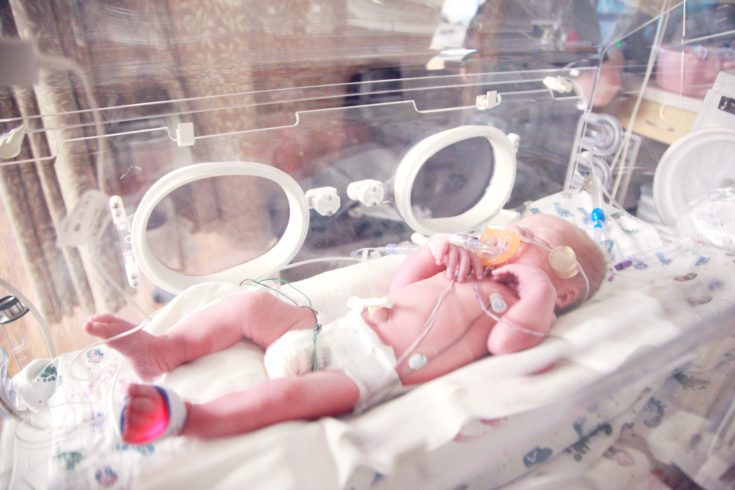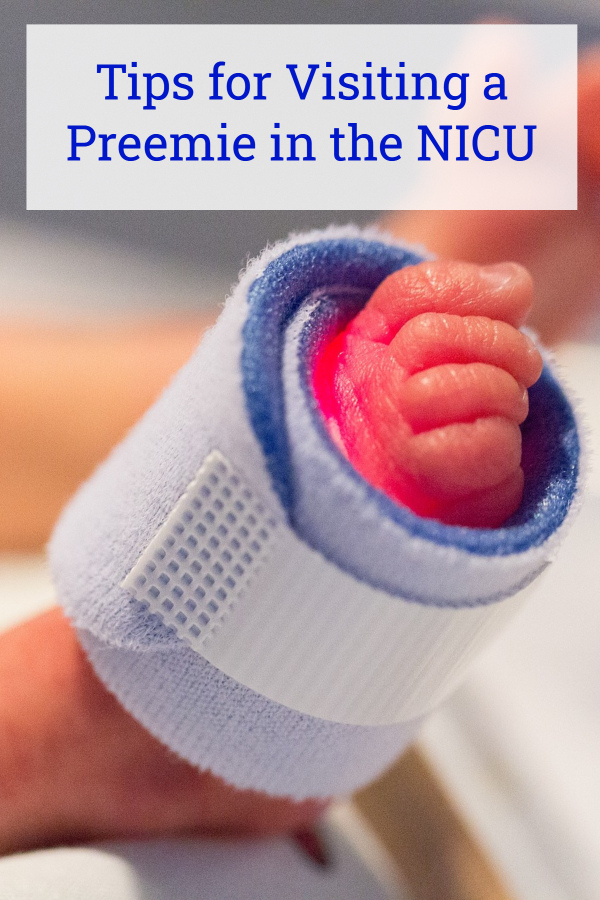Disclosure: This post may contain affiliate links, meaning we get a commission if you decide to make a purchase through our links, at no cost to you. Please read our disclosure for more info.
Everyone loves to visit a new baby. Preemies aren’t excluded from this list, but visiting them is a lot more complicated. Although some things are the same, it’s important to learn what you should know before visiting a preemie in the hospital so you can be prepared for it; especially if they’re in the NICU or critically ill.

In This Post:
- What you should know before visiting a preemie in the hospital
- It’s a very clean environment
- You probably won’t be able to hold the baby
- It’s surprisingly noisy
- Even mostly healthy babies might be hooked up to equipment
- You might set off alarms
- It might seem like everyone is speaking a different language
- No one can tell you when the preemie will be able to come home
- It can be stressful
- The last thing you should know before visiting a preemie in the hospital
What you should know before visiting a preemie in the hospital
The most important thing to keep in mind is that not everyone is going to be able to visit a premature baby in the hospital. In some hospitals, and especially NICUs, visitation might be restricted by age or family relation. In certain circumstances, only the parents can visit. Visitation might also be restricted to certain hours of the day for anyone who is not immediate family.
You also can’t visit if you’re sick, even if it’s just a cold. Newborns already have weak immune systems, but preemies are especially fragile. Even if the baby you’re visiting is healthy, there are often other more critical infants in the NICU that could get sick.
Most hospitals have strict visitation policies in their NICUs and infant nurseries. The only people who are allowed to come and go freely are the parents. If you want to visit a preemie in the hospital you’ll probably have to have at least one parent with you to escort you in.
Hopefully these tips will prepare you with what you should know before visiting a preemie in the hospital so there’s no surprises.
It’s a very clean environment
When coming into the NICU or even a nursery in the hospital you’ll be asked to wash your hands thoroughly. You also likely won’t be allowed to bring certain things in including food and drinks. Just like visiting any other hospital, you should avoid wearing strong scents and smoking before coming in.
You’ll also be hand sanitizing before and after doing anything with the baby, including every time you touch him or her.
You probably won’t be able to hold the baby
Whether you’re able to hold a preemie in the hospital will depend on a few things. The first, and most important, being how healthy the baby is. Micro Preemies and sick babies do still get held, but getting to the point where you can hold them is a huge process. Usually hospitals limit that to the parents only.
Hospital policy is also going to affect whether or not you can hold a baby you’re visiting in the NICU or hospital nursery. Some have certain restrictions about who can hold infants, and most don’t allow you to just pick up a baby without a nurse present.
If the baby is in an incubator they try to limit how long they’re outside so they don’t get cold. Depending on the circumstances you might get to touch the baby, though.
It’s surprisingly noisy
You might not be allowed to have loud conversations but overall being in a NICU or intermediate care nursery is shockingly loud. Sometimes there will be babies crying, which is expected, but for the most part the babies are the quiet ones.
What you will hear a lot of is the beeping of monitors and the sounds of alarms going off. It might be scary at first, but most of the time these noises are false alarms when monitors get disconnected.
Even mostly healthy babies might be hooked up to equipment
If you’re going to see a micro preemie or one that’s suffering from other health issues, you’ll probably expect to see them hooked up to a lot of medical equipment. Most commonly these will be CPAP (or intubation), IV (fluids and nutrition), gavage tube (for feeding), and monitors for their vitals.
All this equipment can look scary the first time you see it hooked up to a tiny baby. Even a late term preemie in the NICU for feeding issues still probably will have a feeding tube and monitors for their vitals. You probably won’t be allowed to take these off to hold them, either.
You might set off alarms
The vital alarms are very sensitive, but also don’t get attached very well to the baby. That means that while picking up or even touching the baby you might disturb the sensors and make the alarms go off. A nurse will come and check it out and put back on the sensors, so it’s not a big deal.
Unlike the vital monitors, though, you need to be very careful not to hurt any of the other ‘wires’. Gavage tubes, CPAP machines, and IVs are delicate and can be harmful if pulled out by accident.
It might seem like everyone is speaking a different language
There’s probably already a few words in this article you’re unfamiliar with. Terms that many people never hear become second nature to parents of preemie babies in the NICU. Here’s some common ones that you might hear:
Gavage feeding: A tube that puts breastmilk or formula right to the baby’s stomach when they’re too weak to suck from a bottle or breast.
Events: Something negative that happens to the baby’s vitals such breathing difficulties or a drop in heart rate.
Jaundice: Many NICU babies will end up with jaundice, which is a problem with babies being unable to break down bilirubin. They’ll look a bit yellow and have to stay under UV lights for a period of time.
CPAP or intubation: CPAP means Continuous Positive Airway Pressure and it helps babies breathe (this is the same type of machine that people commonly use for sleep apnea at night). Intubation involves using a ventilator and is for babies who can’t breathe on their own.
Car seat challenge: A test that babies born before 37 weeks have to go through before being discharged from the hospital to make sure they can ride in a car seat without any negative effects.
No one can tell you when the preemie will be able to come home
Anyone with a baby in the hospital only wants to know one thing: when will they be well enough to come home. Unfortunately for preemies there’s no easy answer to this question. Usually they tell families to expect a premature infant to stay in the hospital until their original due date.
There’s so many factors that can affect when babies come home and they can change (for better or worse) quickly during their hospital stay. The parents are already wondering when everything will be ok, so do not probe them with questions that will remind them of their stressful situation.
It can be stressful
If you’re excited to visit the new baby visiting a preemie in the hospital might be stressful. The goal of the hospital is to get the baby healthy, which means you won’t be able to have a ‘normal’ visit like you would with a full term baby. There are specific rules you have to follow and the hospital staff will enforce them. Some hospitals are more strict than others, which can also add to the stress.
You’ll probably also be feeling bad for the parents who’s preemie is in the hospital. If you can, try and offer your support by helping arrange meals, care of other children and pets, and giving them someone to talk to.
The last thing you should know before visiting a preemie in the hospital
If you’re visiting a baby that isn’t yours in the hospital, make sure you take great care to follow the rules. It’s vital that you are in good health, practice great hand hygiene, and respect the instructions of the hospital staff. Read up on what you should know before visiting a preemie in the hospital so you know what to expect and can better support the parents during your visit.

